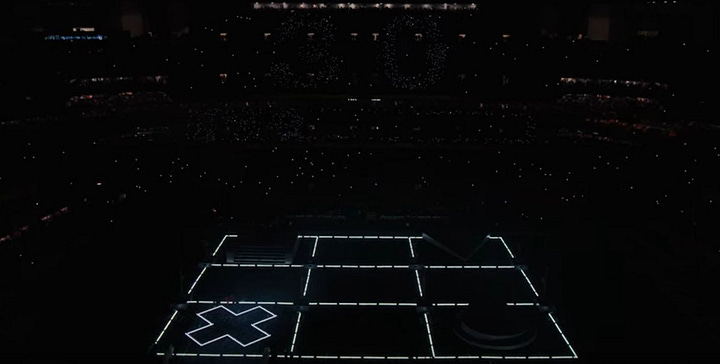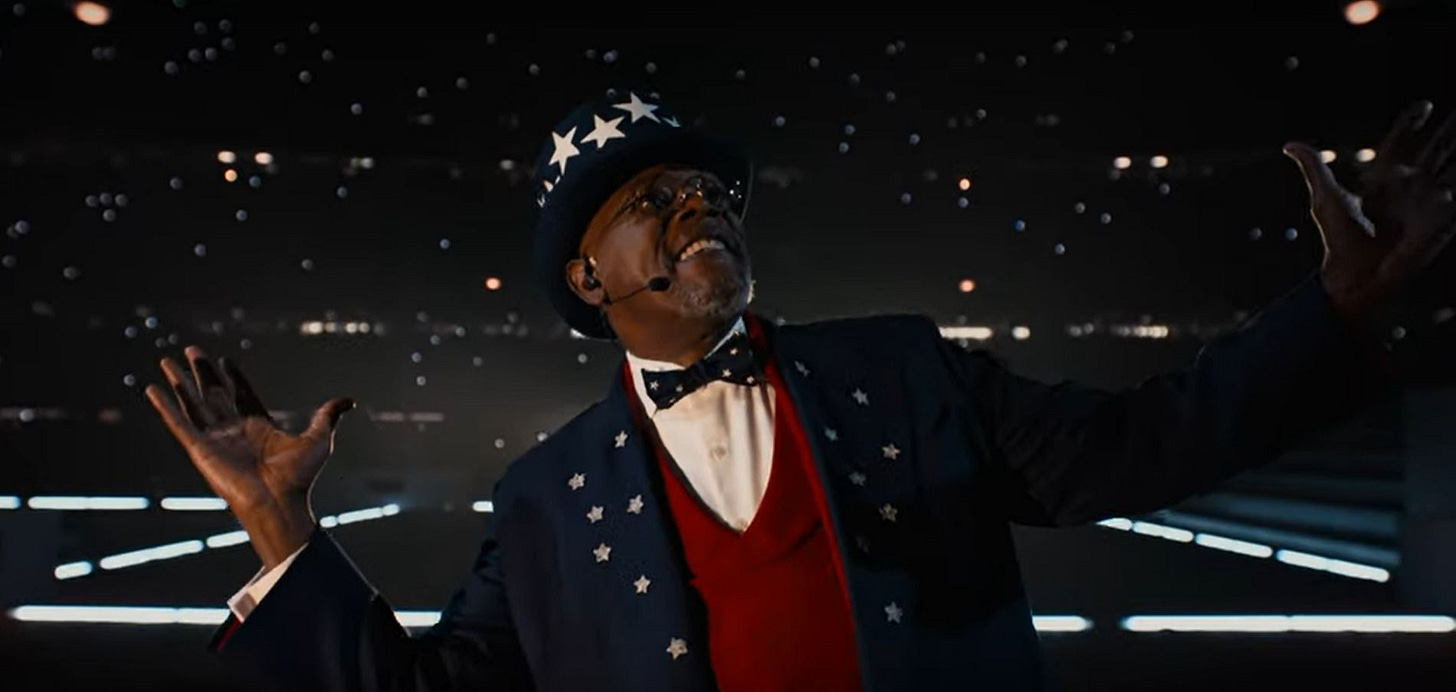The Culture Cheat Code
I didn’t watch the Super Bowl this year, but I‘m glad I watched Kendrick’s performance.
When I saw Samuel L. Jackson1 play as Uncle Sam in Kendrick Lamar’s performance at the Super Bowl halftime show, I couldn’t help but think of Rocky IV.
Rocky IV was the first Rocky movie I ever saw. I watched it syndicated on cable with my mom2, who gave me some background on the other three movies as we started it. The magnanimous Apollo Creed (Carl Weathers)3, the stand-in for Muhammad Ali and all self-assured Black athletes, would be fighting an exhibition match against Ivan Drago (Dolph Lundgren), who despite being a citizen of the Soviet Union, was clearly a projection of America’s id and desire for an Übermensch.
For Apollo Creed’s entrance, he would be introduced by James Brown singing, “Living in America.” Ivan Drago would be set into a daze by a sensory overload of bright lights, scantily clad women, models of WWI war plans, sounds of fireworks (bombs?), American flags, and a band that definitely brings to mind Sexual Chocolate. When Apollo Creed finally appears, it is on a descending platform with a golden bull blowing smoke and slowly breaking apart behind him. He is adorned with the American flag from head to toe, from the top hat of Uncle Sam to his boxing trunks. He dances to the music, going from the platform to James Brown as every one chants, “I live in America!”
Apollo Creed would go on to die in the ring, and inspire Rocky to fight again.4
“Salutations! It’s your uncle, Sam. And this is the great American game!”
Samuel L. Jackson’s Uncle Sam did not simply represent America, he represented the Black people whose place in America is dependent on how well they serve its interests. They adorn themselves in patriotism and other legible pieces of the white American imagination so that they can be seen as equal and worthy. The lie they tell themselves is that if they can speak as they’re supposed to, look like they’re supposed to, and act like they’re supposed to, then they will be safe. Safe from denigration, imprisonment, and physical death.
“No, no, no, no, nooooo! Too much! Too reckless! Too ghetto! Mr. Lamar, do you really know how to play the game? Then tighten up!”
Kendrick performed on the biggest annual stage for propaganda that the United States has, and there are rules to be followed. As a Black performer, you have to sanitize your music of almost all of its context and not rock the boat. The previous Super Bowl Kendrick appeared in was a tribute to the early 00s, every artist performed in their own separate sets, with him literally appearing out of a box. Similar to Beyoncé’s cameo during Coldplay’s halftime show, the extremely Black symbolism of his set needed to be tightly contained and remain a footnote. “Alright”, a song that became a part of Black social justice movement across the country when it released, could barely breathe within the minute and half it was given, and mention of police had been omitted.


In much bigger boxes this time around, Kendrick pushes against the Super Bowl stage’s boundaries harder through what is seen, not heard. The conservative audience nationwide still got their American flag, but it adorns no singular Black man. The flag is made through the collective of these men working in tandem. Black men wearing Blood Red and Crip Blue for that matter, linked by those wearing neutral white. And the clothes everyone wore on set with Kendrick were street clothes in a literal sense. Not only were they wearing the type of clothes you’d see out and about in LA, the set revealed itself to also be a literal street.
In this street, the dancers mobilize, march, and get in formation around Kendrick. The streetlights burst, then reveals a group of Black men singing in harmony underneath a streetlight. While New Jack City also came to mind, I first thought of the memorials made at the place someone is killed. Though there were no signs, pictures, candles, or teddy bears, the Black men singing in harmony held vigil as the memorial of those whose lives were taken too soon.
“Oh, I see you brought your homeboys with you. The old culture cheat code. Scorekeeper, deduct one life.”
Uncle Sam wants nothing more than the system to work as intended, with punishment meted out against those who challenge it. No one housed deeply inside an American institution or system wants anyone testing its shaky foundation. If the institution or system were ever to fall, the people who depend on the system most will suffer the gravest. When that happens, the empty promise of safety within it crumbles. Uncle Sam is ultimately an impotent and scared man who lives in constant fear of losing what little he has, because he know that his worth is only measured by his usefulness in maintaining the status quo.
Thinking back to Rocky IV, Apollo remarked to Rocky that “[i]t’s crazy how people just care about you in that ring and when you’re bleeding, but once you step out that ring you’re ancient history.” Rocky tries to convince him that his best is behind him, and that the two of them are changing into “regular people.”
Apollo rejects the notion.
“No, [Rocky]! Maybe you think you’re changing. But you can’t change what you really are. And you can forget all this money and stuff you got all around you man, ‘cause it don’t change a thing. You and me, we don’t even have a choice. See, we’re born with a killer instinct that you can’t just turn off and on like some radio. We have to be right in the middle of the action because we’re the warriors. But without some challenge, without some damn war to fight, the warrior may as well be dead, [Rocky].”
It’s easy to see his situation as a desperate and hopeless one. A situation that isn’t dissimilar to that of an NFL athlete.
The average career of an NFL athlete lasts three years, and professional football is predominately played by Black men. The money they earn is based on their perceived ability to produce and serve their function on the field. All of these athletes have been training the majority of their lives for the opportunity to play in the Super Bowl, and many of them will never play in one again. Like Apollo, even with the guarantee of an early death, the players on both teams are left with little recourse due to their talent and what they were allotted. They know their role, and seek to make the most out of it in hopes that they can be seen as worthy of their pay and tentative status.
And just like Apollo, they are used to fuel the white American desire for hyper-masculinity. Though they may never embody it themselves, many white men use the existence of these Black men to safely project their masculinity upon them without risk of harm. Black men are simultaneously their avatar and their adversary. In order to escape this fate with body and spirit intact, there must be a different measure by which to give oneself.
Which brings me back to the beginning of Kendrick’s performance.
“The revolution about to be televised. You picked the right time but the wrong [nigga].”
While I was initially dismissive of that statement, I had to remember that he was speaking of revolution in the face of a fascist President. He was performing on a field that had the paltry slogan of “End Racism” removed once the NFL could do away with pretense. Kendrick was performing in the stadium owned by an organization that helped do damage control for the Catholic Church’s sex abuse crisis. He was performing on a field where Black men’s life span’s are being shortened with over the course of their careers.
We are all at a crossroads where we have to disentangle ourselves from the institutions and systems that we have been conditioned to rely upon. With each passing day, it is unavoidable that we have to rely upon community to survive a country that only wants us for what they can take from us. At the end of the day, what we looking for will not be on the television or the football field, but in our communities. What we will be measured by will be what we willingly choose to give and receive. It will not be white billionaires who dictate our worth, but our families, friends, and neighbors.
While I don’t believe the revolution was literally televised in that moment, it was a powerful portrayal of one. What was shown was not chaotic and violent. It was organized, unified, and joyful.
I didn’t watch the Super Bowl this year, but I‘m glad I watched Kendrick’s performance.
Your support allows me to continue working and growing my craft that much more. Every bit counts, and thank you for your consideration!
Read more from Queen’s Muse
(I’ve now gotten into the habit of mourning the inevitable loss of elders. I’m grateful for him and consider him a marvel within the world of Black actors.
Growing up, there was a time where a neighbor let us borrow theirs, and a three-year span afterwards where we only had an antenna. I don’t miss trying to place the aluminum foil on the ends it in a desperate effort to get channel 9 to come back.
An actor whom I feel would have been a much bigger star if he wasn’t Black. He had it all, yet played second fiddle to Stallone and the other action stars.
It’s crazy how small a footnote the death of Black characters are in the movies I watched. Vivica A. Fox in Kill Bill Vol. 1 is another example that comes to mind.






So well done! I love it!